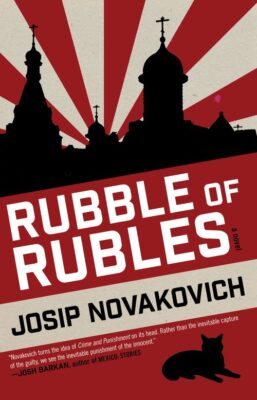Hints of allegory are never far from the surface in Josip Novakovich’s frightening and darkly hilarious new novel Rubble of Rubles.
Early on in the book, David, a Russophile American ex-banker looking for opportunity in Saint-Petersburg, goes to the circus with Yuliya, a young woman he’s only just met (and lusts after). The show doesn’t go as planned and the monkeys revolt – to David’s delight. “That was fantastic,” he says to Yuliya.
– A monkey revolution. What a horrible system, to abuse all these animals for our fun.
– I will never visit a circus again.
– As long as you are in Russia, you are in a circus.

Rubble of Rubles
Josip Novakovich
Dzanc Books
$16.95
paper
216pp
9781950539642
As such, Rubble of Rubles is notably topical. It paints a jet-black portrait of the twenty-first century Russian soul – a soul so battered and cynical it grasps at whatever it can to survive both materially and spiritually, reacting to all forms of violence, corruption, and decadence with an amoral shrug.
As a story of the early post-communism years in Russia, Rubble of Rubles is filled with animals and beasts of all kinds and depictions of regular people acting in sinister, beastly ways. In this twisted menagerie – full of anarchist monkeys, flesh-eating crows, snow leopards, tattooed inmates, and black-market Cialis traffickers – humans, particularly those in the employ of the Russia state, emerge as the king of beasts.
The action is triggered by David drunkenly urinating on the Kazan cathedral, which may or may not be holy, depending on which cop you talk to. Things spiral absurdly downwards from there. He’s imprisoned in the notorious Kresty prison, and the portrait painted of Russian authorities reads like a nightmare full of clowns. Mind games abound. Putin himself may or may not make an appearance, judo-flipping prisoners over his shoulder and lecturing them on their moral failings.
Throughout the book, David mulls over assorted events and figures from Russia’s past, which anyone with only a passing interest in the brutal history of the riddle-wrapped-in-an-enigma will find eminently juicy.
Romance is non-existent in a land that has become purely transactional. Coupling is, after all, about appetites and survival – sex and money. Yuliya, as the object of David’s desire, skips to the end before even beginning, in a scene that highlights Novakovich’s gift for crisp dialogue:
– Do you pay child support?
– Of course.
– So you are a good man. A Russian man wouldn’t bother to pay child support. Let’s have a child and when we divorce, pay me three thousand dollars a month alimony. I think I could live on that.
Dialogue is one of Novakovich’s strengths, and the long passages of back-and-forth banter hum with paradoxical wit. Many of his best lines come across as throwaways, underscoring the worthlessness of the individual in a dysfunctional and epically oppressive political system.
– Masha, is that you?
– Why would I be me?
Full of colour, savage humour, and absurdity, Rubbles of Rubles is a worthy addition to the best books about Russia. There are surreal touches that bring to mind Bulgakov’s The Master and Margarita, as well as the kind of modern grit you might find in Martin Cruz Smith’s series of Russian detective novels.
Croatia-born Novakovich, whose work deals in themes of modern displacement and the many permutations of Balkan nationalism, has had an impressive career so far. The author of five books of fiction and four essay collections, he’s won a Guggenheim, a Whiting, and an American Book Award, was a finalist for the Man Booker International Prize in 2013, and has been featured in both the New York and L.A. Times.
His latest is a highly entertaining novel full of substance, madness, and whip-smart observations on the state not just of Russia, but of Western culture as well. And it’s bound to leave you wondering why Josip Novakovich, who has called Montreal home for the last twenty years, is not better known here in Canada. mRb






0 Comments